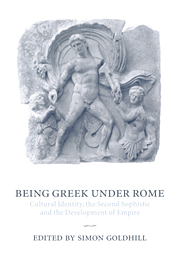Book contents
- Frontmatter
- Contents
- List of contributors
- Introduction: Setting an agenda: ‘Everything is Greece to the wise’
- 1 Subjected to Empire
- 1 From Megalopolis to Cosmopolis: Polybius, or there and back again
- 2 Mutilated messengers: body language in Josephus
- 3 Roman questions, Greek answers: Plutarch and the construction of identity
- II Intellectuals on the margins
- III Topography and the performance of culture
- List of works cited
- Index of major passages discussed
- General index
1 - From Megalopolis to Cosmopolis: Polybius, or there and back again
Published online by Cambridge University Press: 22 January 2010
- Frontmatter
- Contents
- List of contributors
- Introduction: Setting an agenda: ‘Everything is Greece to the wise’
- 1 Subjected to Empire
- 1 From Megalopolis to Cosmopolis: Polybius, or there and back again
- 2 Mutilated messengers: body language in Josephus
- 3 Roman questions, Greek answers: Plutarch and the construction of identity
- II Intellectuals on the margins
- III Topography and the performance of culture
- List of works cited
- Index of major passages discussed
- General index
Summary
The city that they speak of has much of what is needed to exist, whereas the city that exists on its site, exists less. So if I wished to describe Aglaura to you, sticking to what I personally saw and experienced, I should have to tell you that it is a colourless city, without character, planted there at random. But this would not be true, either: at certain hours, in certain places along the street, you see opening before you the hint of something unmistakable, rare, perhaps magnificent; yet you would like to say what it is, but everything previously said of Aglaura imprisons your words and obliges you to repeat rather than say.
(Calvino (1979) 55, ‘Cities and Names 1’)σοϕὁν γἀρ ἓν βούλευμα τἀς πολλἀς χέρας νικᾁ
The many lives of Polybius
Polybius is known for his Histories, which mark the beginning, or on any estimate an important beginning, of the project that in one way and another would occupy the bulk of extant Greek literature – its construal of cultural identity, in Greek writings from Roman citizens. Polybius' text, whether directly or through intermediaries, substantially informed all Roman Greece's notions of the transumption of their East Mediterranean world within the orbit of the barbarian Empire from the West; Polybius' narrative provided a dramatic paradigm for the future fix of imperial Greek identity, as his life and writing negotiated the tensions and torsions of the founding epoch.
- Type
- Chapter
- Information
- Being Greek under RomeCultural Identity, the Second Sophistic and the Development of Empire, pp. 29 - 49Publisher: Cambridge University PressPrint publication year: 2001
- 18
- Cited by



